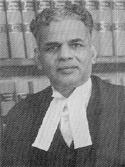
Meet Justice E.S. Venkataramiah and his Notable Judicial decisions
Justice Engalaguppe Seetharamiah Venkataramiah (1924–1997) was the 19th Chief Justice of India, serving from June 19, 1989, to December 17, 1989. He was the first person from Karnataka to hold the position. Venkataramiah began his legal practice in 1946, rose through the ranks as Advocate General of Mysore, and became a judge of the Karnataka High Court in 1970. He was elevated to the Supreme Court in 1979, where he served for a decade before his brief tenure as Chief Justice.
Judicial Career and Philosophy
Justice Venkataramiah was widely respected for his scholarship, integrity, and commitment to judicial efficiency. He authored 256 judgments and sat on 720 benches during his Supreme Court tenure. He was known for his clear grasp of legal fundamentals, thorough preparation, and a strong sense of justice—qualities that shaped his approach to both constitutional and social issues.
Landmark Judgments
1. Indian Express Newspapers v. Union of India (1984)
Justice Venkataramiah led a three-judge bench that addressed the impact of import duties on newspapers, which was challenged as a violation of freedom of speech and expression. The bench ruled that while the government could levy taxes, such taxation must not be excessive or infringe upon press freedom. The judgment directed the government to review its policy, reinforcing the constitutional guarantee of free speech and setting limits on state interference with the media.
2. M.C. Mehta v. Union of India (1987) – Ganga Pollution Case
In a landmark environmental judgment, Justice Venkataramiah ordered the closure of tanneries in Kanpur that were discharging toxic effluents into the Ganga river. The bench held that industries could not operate without primary treatment plants and mandated immediate compliance. This decision was pivotal in recognizing the right to a clean environment as part of the right to life under Article 21 and established judicial activism in environmental protection.
3. K.C. Vasanth Kumar v. State of Karnataka
Justice Venkataramiah’s opinion in this case was instrumental in recognizing the enforceability of the principle of "equal pay for equal work" under the Constitution. He held that differential pay scales for male and female stenographers violated the right to equality, marking a significant advance in gender justice and labor rights.
4. Special Procedure and Fundamental Rights
In a notable reference order, Justice Venkataramiah questioned the constitutionality of special procedures that prejudiced accused persons in criminal trials, emphasizing that any deviation from ordinary procedure must withstand scrutiny under Article 14 (equality before law). His intervention led to a landmark decision upholding the rights of the accused against arbitrary legislative procedures.
Legacy
Justice Venkataramiah was a strong advocate for reducing judicial arrears, proposing the appointment of retired judges as ad hoc judges. He was also instrumental in appointing Justice Fathima Beevi, the first woman judge of the Supreme Court. His leadership in legal aid and commitment to access to justice for the marginalized further enhanced his legacy. Justice Venkataramiah is remembered as a scholar among judges, whose judgments advanced press freedom, environmental protection, gender equality, and procedural fairness in Indian law.












comments